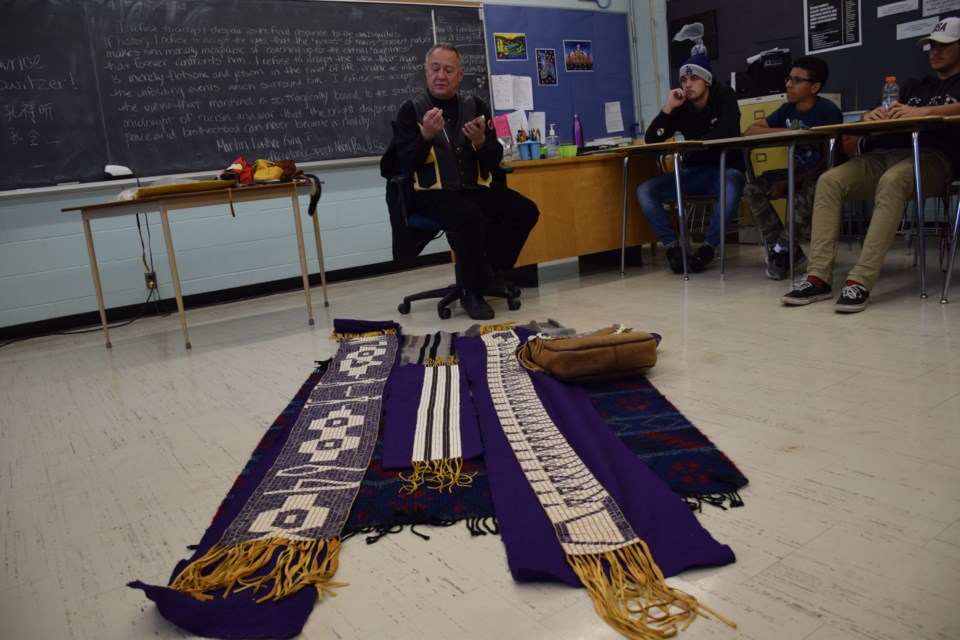Wampum belts in simple patterns, but containing intricate information, were set out in a Guelph classroom Wednesday, as part of an introduction to the significance of country’s treaty history.
Most of those in the Centennial CVI Grade 11 English class, which includes students from all over the world, were getting their first exposure to the legal agreements forged between British authorities and the indigenous nations of this land dating back to the 18th century.
The belts brought by Ontario Human Rights Commissioner Maurice Switzer told some of that history, and some of the details of those agreements.
Switzer’s visit was part of Treaties Recognition Week, going on this week in the Upper Grand District School Board, and across the province.The teenagers got a glimpse into agreements that were oft broken, but which remain legally binding.
Switzer’s presentation was formatted like a traditional aboriginal gathering, with everyone seated in a circle. A smudging ceremony was carried out to start the event, filling the room with the scent of sage smoke. And each person in the circle, about 15 in total, was given an opportunity to speak. Most said a few words about their origins.
Switzer, a former newspaper editor who lives in North Bay, is a member of Alderville First Nation. He wove his wisdom about treaties throughout a participatory presentation, telling stories about aboriginal beliefs and practices, and giving students a picture of aboriginal life before contact with French and British settlers.
He said that the first explorers to land in what became Canada soon realized that original inhabitants would fight, and fight fiercely, to protect their land. Confrontations with the Innu, he said, ultimately drove the Vikings away.
The British also realized that using force in order to settle on indigenous lands was not viable. Therefore, treaties were signed – formal agreements between nations that outlined the conditions under which they would co-exist.
Switzer urged the students to understand the origin of Canadian names, and to learn the names of aboriginal heroes from the past. Many place names, including Canada, Ontario, Toronto, Mississauga and Ottawa, are derived from aboriginal words.
During the War of 1812, it was warriors from aboriginal nations that were largely responsible for fighting to protect British lands in Canada. Aboriginal war captains like John Brant (Ahyonwaeghs) and John Norton (Teyoninhokovrawen) should be known and honoured by all Canadians, Switzer told the students. Canada would not exist without their efforts.
The aboriginal way of life, he said, differed markedly from that of the settlers. The First Nations took only what they needed from the land, never wasted anything, and never hunted for fun. They valued human life, and each other’s territories. Theirs was a sharing culture.
Treaties were signed, in part, to ensure that aboriginal lands and way of life were preserved. And those treaties, Switzer said, were sacred. They had no time limit, and are still valid today.
The peaceful settlement of Canada, he said, began with the treaties.
The question now, he said, is what are we going to do about the promises outlined in the treaties which have not been kept. He encouraged the students to explore the truth about treaty history, and to work for reconciliation between indigenous people and those who settled on indigenous lands.
“He’s really very wise, and he could have gone on for another hour or more,” said Arin Kimmel, 15, speaking of Switzer. “I didn’t know any of this information about First Nations or the treaties. It’s really good to know”
Earlier this year, the government of Ontario passed legislation that recognizes the importance of treaties, while raising awareness about treaty relationships between indigenous and non-indigenous people in the province of Ontario. The Act designated the first week of November each year as Treaties Recognition Week.
